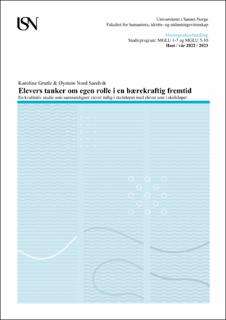| dc.contributor.advisor | Aschim, Elin Leirvoll | |
| dc.contributor.author | Sandvik, Øystein Nord | |
| dc.contributor.author | Grutle, Karoline | |
| dc.date.accessioned | 2023-07-15T16:41:37Z | |
| dc.date.available | 2023-07-15T16:41:37Z | |
| dc.date.issued | 2023 | |
| dc.identifier | no.usn:wiseflow:6874543:55161110 | |
| dc.identifier.uri | https://hdl.handle.net/11250/3079343 | |
| dc.description.abstract | Bærekraftutfordringene vi står overfor er et veldig sentralt tema i dagens samfunn, og en problematikk dagens ungdom kommer til å møte når de blir voksne. Vi lurer derfor på hva dagens unge tenker om bærekraftsutfordringene vi står overfor. Har de det som kreves for å kunne ta del i arbeidet mot en mer bærekraftig verden, og har de troen på at vi kan få til dette i fremtiden? Vi er også nysgjerrige på om dette endrer seg oppover i skoleløpet. I denne masteroppgaven har vi derfor undersøkt følgende problemstilling: Hvilke tanker har elever om deres egen rolle i fremtiden sett i lys av bærekraftig utvikling?
Metoden vi har brukt er kvalitative, semistrukturerte gruppeintervju. Vi hadde ett gruppeintervju med fire fjerdeklassinger og ett gruppeintervju med fire tiendeklassinger. Vi benytter oss av teori om handlingskompetanse, håp, fremtidstenking og motivasjon.
Gjennom studien har vi undersøkt hva elever fra fjerde- og tiendeklasse tenker om fremtiden når det gjelder bærekraftig utvikling. Vi har undersøkt hvilke tanker de har om bærekraftig utvikling, hvordan man kan handle mer bærekraftig, deres egne påvirkningsmuligheter og hvilke utfordringer de vet vi står overfor. Vi har også forsket på hvordan de tror fremtiden blir, skolens rolle hva gjelder bærekraft og hva håp har å si for å oppnå en mer bærekraftig fremtid. Gjennom våre undersøkelser har vi sett at elevene ikke er ukjente med temaet. Vi finner tegn til handlingskompetanse hos samtlige elever, selv om det er variasjon innenfor de ulike komponentene av handlingskompetansebegrepet. Vi så også en forskjell mellom elevene på de to ulike trinnene. Elevene viser tegn til håp for fremtiden. Det så ut til å være betydelig forskjell mellom elevene i fjerde- og tiendeklasse når det kom til fremtidshåp, da våre informanter fra fjerdeklasse var betydelig mer positive til fremtiden enn det våre informanter fra tiendeklasse var. | |
| dc.description.abstract | The sustainability challenges we face today is a very central topic in today's society, and a problem that our youths will face when they grow up. We therefore wonder what today's children and adolescents think about the sustainability challenges they must face in the future. Do they have the required action competence to be able to take part in the work towards a more sustainable world, and do they have the faith that we can achieve this in the future? We are also curious as to whether this changes as the educational system progresses. In this master's thesis, we have therefore addressed the following problem: What do students think about their own role in the future in the light of sustainable development?
The method we have used in this study is qualitative semi-structured group interviews. We interviewed two groups of four students: one in the fourth grade in the Norwegian primary school and one in tenth grade in the Norwegian primary school. We have used theory about action competence, hope, future thinking and motivation.
Throughout the study, we have investigated what pupils from fourth and tenth grade in the Norwegian primary school think about the future in terms of sustainable development. We have investigated what thoughts they have about sustainable development, how we can act more sustainably, their own influence and what the students know about the challenges we face. Also, we have researched what they think the future will be like, the school's role in terms of sustainability and what hope has to say in order to achieve a more sustainable future. Through our research, we have seen that the students are not unfamiliar with the topic. We find signs of action competence from all students, even though there is some variance within the various components of the concept of action competence. We also saw a difference between the students at the two different grades. The students also show signs of hope for the future. This appeared to be significantly different between the students in fourth and tenth grade, as our informants from fourth grade were significantly more positive about the future than our informants from tenth grade were. | |
| dc.language | nob | |
| dc.publisher | University of South-Eastern Norway | |
| dc.title | Elevers tanker om egen rolle i en bærekraftig fremtid | |
| dc.type | Master thesis | |
